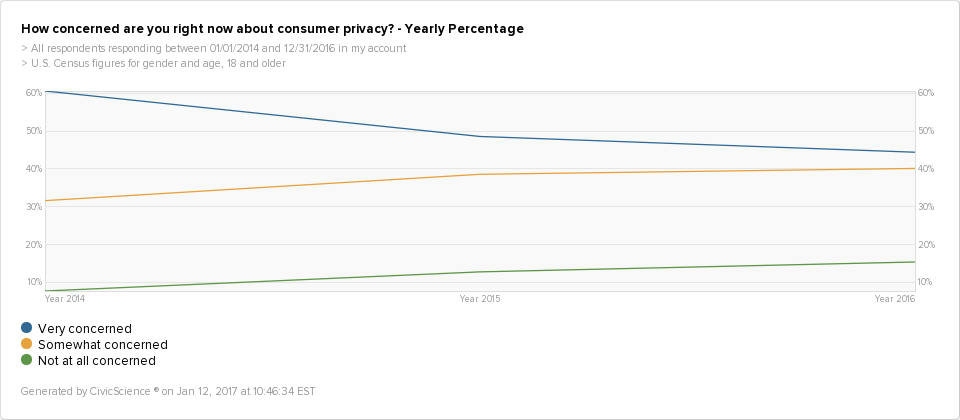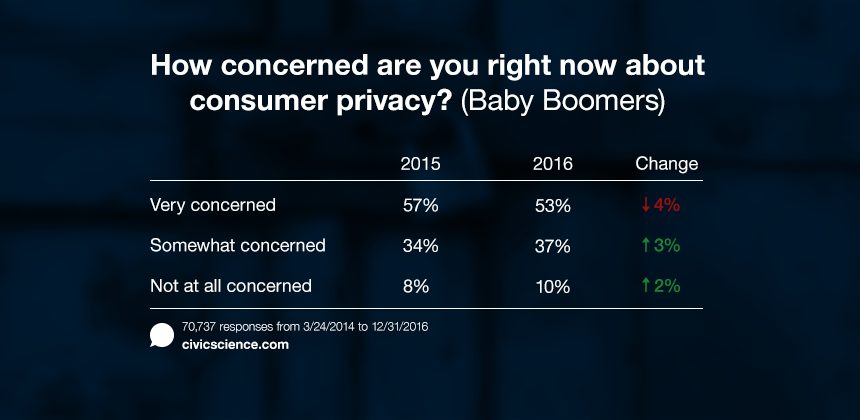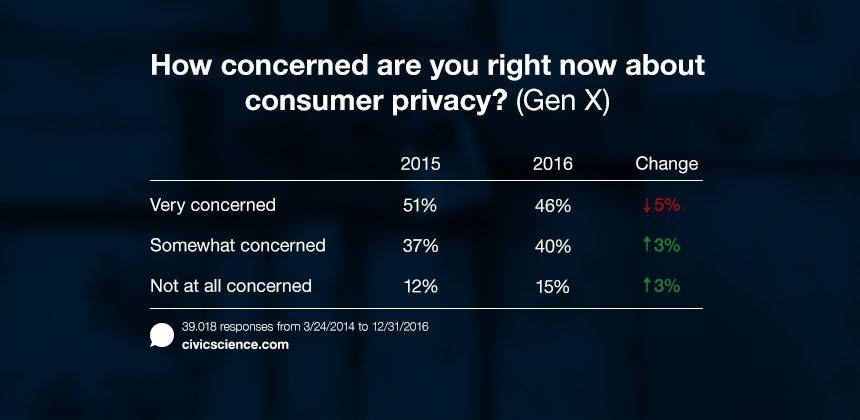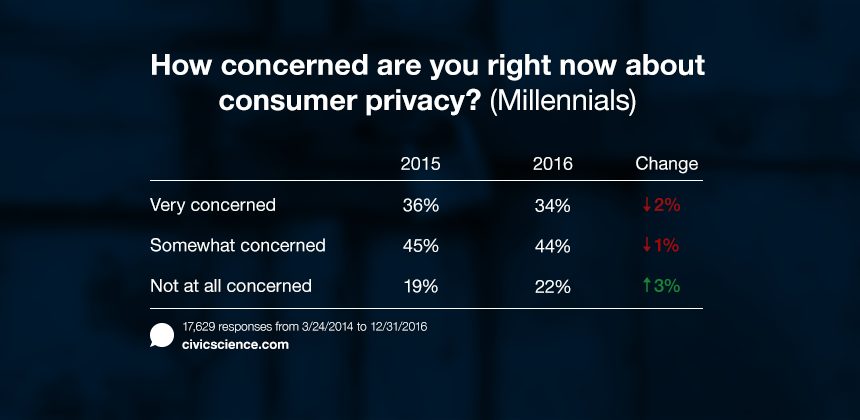In an age where exchanging your personal information is the cost of entry into the digital world, it’s no wonder that concern for exactly what is done with that information is heavily discussed. Although many speculate that consumer privacy will be the most pressing issue of the new generation, is that an accurate forecast? According to the data, it seems possible.
To start on the same page, take a look at this trending graph showing attitudes surrounding consumer privacy among all U.S. adults:
Those who say they’re “Very concerned” about consumer privacy have dropped year over year. In 2015, 49% of adults say they were very concerned with consumer privacy, while that number at the end of 2016 rested at only 44%. In addition, those who say they are “Not at all concerned” or “Somewhat concerned” have continued to increase. Have other societal issues trumped (pun intended) the issue of consumer privacy?
When we segment concerns for consumer privacy by generation, the results become that much more interesting. Let’s start with the wisest generation.
Baby Boomers (55+)
Baby boomers are most likely to be very concerned with consumer privacy, but it might not be that way for long.
From 2015 to 2016, baby boomers who say they’re “Very concerned” about consumer privacy dropped by 4% – which is twice as large as the drop among Millennials, and almost as large as the drop among Gen X. In addition, those who say they’re “Somewhat concerned” with consumer privacy increased by 3%, which is the same among our next group – Gen Xers.
Gen X (35-54)
It’s evident that among Gen Xers, there’s large concern surrounding consumer privacy. In fact, at the end of 2016, 46% of Gen Xers were “Very concerned” about consumer privacy, while only 34% of Millennials were. Over the last year, however, there was a greater drop in concern among Gen Xers than both Baby Boomers and Millennials.
From 2015 to 2016, the number of Gen Xers who say there are “Very concerned” about consumer privacy dropped by 5%, while that number only dropped by 2% among Millennials. If this trend continues, it’s possible that younger folks may soon be the most concerned generation about consumer privacy.
Millennials (18-34)
As shown, Millennials who say they are “Very concerned” about consumer privacy dropped this year, just like other generations. In 2015, 36% of Millennials were “Very concerned” about consumer privacy, and 45% were “Somewhat concerned.” At the end of 2016, those numbers were 34% and 44%, respectively. Among this group, there are largely two interesting findings to note:
1) Out of all adults (18+), Millennials are the least likely to say they’re “Very concerned” with consumer privacy – but that’s not the whole story.
2) Although Millennials are least likely to be “Very concerned” with consumer privacy, those who are “Very concerned” saw a smaller decrease than other generations this past year. In other words, Millennials who are “Very concerned” only dropped by 2% this year over last, compared to a decrease of 5% among Gen Xers, and 4% among Baby Boomers.
So What?
It seems that all this talk about consumer privacy might not be having as significant effect as one might think. All around, those who say they are “Very concerned” about consumer privacy have dropped year over year, with the most visible drop among Gen Xers. Although Millennials follow the same trend, those who are strongly concerned about consumer privacy are falling at a slower rate than other generations. If the trend continues, it’s possible that Millennials will be the generation most concerned with consumer privacy in just a few years.
As a last point, it can’t be too great that Americans are consistently less concerned about consumer privacy year over year, especially considering the growing risks. Are there other pressing issues? Of course. However, focusing on the information we put out in the world, and the way that information is used, can’t be overlooked.
Interested in other insights? Check out our most recent Ebook on our most fascinating consumer tech findings of 2016! Looking for something shorter? Check out our update on American sentiment towards Uber’s self-driving cars!












